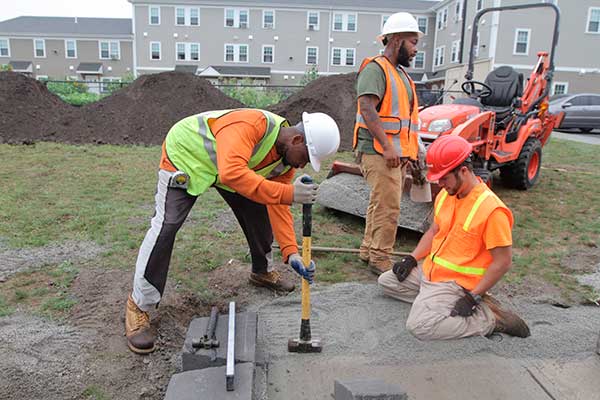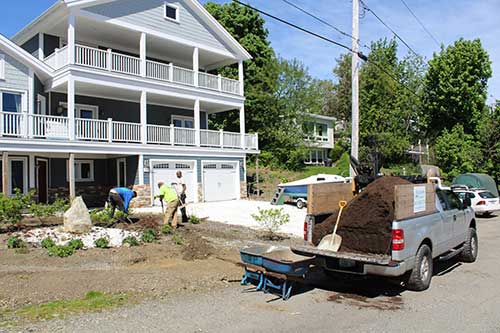Economic Benefits

From residential rain gardens to large public works, green infrastructure engages financial transactions. Beyond the obvious that any construction generates economic activity, implementing green infrastructure projects develops a skilled workforce, stimulates an economy across the entire landscape supply chain, invests in the capital of engineered features, enhances tourism, and opens continuing opportunities for the extensive work needed to retrofit the urban and suburban landscape to infiltrate stormwater to beneficial use.
Jobs
The long-established nursery industry has long been an economic engine in Rhode Island, accounting for more than half of the state’s agricultural economy. The propagation and growth of plant stock for landscaping requires labor and skills that add radiating value.
GroundWork has done environmental sector job training since 2002. Stormwater management, green infrastructure, and sustainable urban landscaping have been their major focus since 2009. Groundwork also runs a landscaping social venture called GroundCorp, which hires graduates of their job training programs and conducts green infrastructure installations and maintenance work on both residential and commercial properties around Providence and nearby municipalities.
WRWC’s River Rangers have learned landscaping skills as well as presentation skills to promote projects that improve water quality through managing landscapes in the watershed neighborhoods.
UPP Arts (formerly Urban Pond Procession) hires artists to collaborate with teachers to educate youth and the public about stormwater runoff, green infrastructure and local history. It also hires performance artists for its annual procession, which brings communities together to celebrate environmentally vulnerable places and generates income for local vendors.

The Rhode Island Nursery and Landscape Association is the umbrella organization for the $2.5 billion dollar agriculture and plant-based industries in the state. RINLA represents nearly 500 green industry members who include nurseries, landscape contractors, arborists, masons, garden centers, turf farms, landscape architects and designers, suppliers and allied businesses.
Compounding economic activity occurs, creating jobs, as landscape maintenance, education, and recreational opportunities are developed. The range of wages is great providing earnings opportunities for low-skill workers to highly educated planners, engineers, landscape architects, and architects.
Tourism
Rhode Island’s $4 billion tourism economy depends upon a clean environment. From sailing opportunities on Narragansett Bay to swimming at state beaches, to the Dragonboat & Pawtucket Arts Festival on the head of Blackstone River to Providence’s successful WaterFire, clean water, reduced flooding and green spaces will always remain critical to the success of this industry,
Business opportunities
Entrepreneurial initiatives in green infrastructure range from independent landscape maintenance to corporate engineering, landscape design, and architectural services. Although in-ground projects are often associated with green infrastructure, the design of new buildings and the retrofitting of old to capture runoff is critical to solving the problem of how to manage stormwater in our increasingly impervious developed areas.
Finance
The Rhode Island Infrastructure Bank negotiates bonding and loans to fund major public works projects, among which will be stormwater management including green infrastructure.